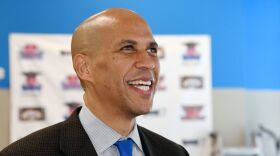Sen. Bernie Sanders of Vermont is giving it another go, launching a second campaign for the White House four years after surprising Democrats with a strong bid for the party's 2016 nomination.
"We began the political revolution in the 2016 campaign, and now it's time to move that revolution forward," the independent senator told Vermont Public Radio in an interview airing Tuesday morning.
But this 2020 bid will undoubtedly be a very different presidential campaign than his quest for the Democratic nomination as an underdog in 2016. Sanders enters the race as a top contender who, along with former Vice President Joe Biden, tops most early polls, far outpacing other Democratic candidates in support and name identification.
It's a sharp contrast from when Sanders seemingly came out of nowhere to surprise the political class — and at times himself — by winning several key primaries against former Secretary of State Hillary Clinton. Buoyed by a big early win in New Hampshire, Sanders fought Clinton for the Democratic nomination through the final June contests, drawing tens of thousands of supporters to rallies in the process.
In the years since his loss to Clinton, Sanders has remained a national leader of the Democratic Party, though he still refuses to join.
"I think we have had real success in moving the ideology of the Democratic Party to be a pro-worker party, to stand up to the billionaire class," Sanders told NPR during the 2018 midterms. "We've got a long way to go."
Many of the issues he has promoted for years — most notably a Medicare-for-all national health care plan and a $15 an hour minimum wage — have shifted from the party's fringe to its mainstream, and are now seen as effective litmus tests for presidential candidates.
Indeed, Sanders' most recent Medicare-for-all bill was cosponsored by fellow presidential candidates Sens. Kamala Harris, Kirsten Gillibrand, Cory Booker and Elizabeth Warren. The Senate's other presidential candidate, Amy Klobuchar, co-sponsored Sanders' most recent $15 minimum wage bill, in addition to the other four.
Sanders pointed to the Democratic Party's leftward shift as a reason for a second run. "It turns out that many of the ideas that I talked about — that health care is a right, not a privilege, and that we've got to move toward a Medicare-for-all, single-payer system: very, very popular. The idea that we have got to raise the minimum wage to $15 an hour," he told Vermont Public Radio. "When I talked about making public colleges and universities tuition-free and lowering student debt, that was another issue that people said was too radical. Well, that's also happening around the country."
But running in 2020, Sanders could be a victim of his own success.
While Sanders provided liberal Democratic primary voters with a sharp contrast to Clinton's political pragmatism in 2016, progressives will have no shortage of candidates to choose from in the increasingly broad and diverse 2020 field.
Most declared Democrats support Sanders' vision of nationalized health care, and more robust federal programs and policies, all funded by higher taxes on top income earners.
And in a party that has placed an increasing premium on being more representative of the broader electorate and country in recent years, many other candidates will offer voters the 77-year-old's platform — with the added benefit of youth and diversity.
"My question is, does he provide added value in this campaign for 2020? Or are there a lot of people who sort of carry very similar messages? Does it have to be him? I don't think it does, and I admire him," New Hampshire radio host Arnie Arnesen, a 2016 Sanders supporter, recently told NPR. "I think it's time for us to start creating a new bench. And the new bench isn't old, it shouldn't be white and it probably shouldn't be male."
Asked by Vermont Public Radio how he will pitch his candidacy in such a diverse and progressive field, Sanders argued, "We have got to look at candidates not by the color of their skin, not by their sexual orientation or gender and not by their age. I think we have got to try to move us toward a nondiscriminatory society that looks at people based on their abilities, based on what they stand for."
There have been hurdles as Sanders prepared to run again in 2020. His campaign has had to answer to charges of sexism and harassment by staffers in 2016, with his former campaign manager acknowledging "a failure." Sanders also had to clarify comments about the role of racism in the 2018 campaign, addressing the losses of gubernatorial candidates Andrew Gillum in Florida and Stacey Abrams in Georgia.
Sanders took several steps to maintain his national political profile and strengthen his presidential prospects in recent years, including his support for Democratic candidates in 2018.
Frequently criticized by the Clinton campaign during 2016 for ignoring foreign policy, he delivered several high-profile speeches laying out a progressive worldview that attempts to thread the needle between a broad, America-As-World-Police approach to international politics, and President Trump's isolationist views.
Sanders also played a lead role opposing Republican attempts to repeal the Affordable Care Act and engaged with the Democratic National Committee that famously opposed his 2016 campaign, as revealed in internal emails stolen by Russian hackers and posted to Wikileaks.
In the wake of the 2016 campaign, the DNC changed its presidential nominating process, in part by largely removing party leaders known as "superdelegates" from influencing the selection, a move Sanders supported.
Copyright 2025 NPR







